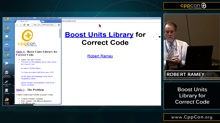Metashell 3.0.0 is available
Metashell provides a compile-time debugger for debugging template instantiations and macro usage.
Metashell 3.0.0 is available
From the website:
Some of the major new features in 3.0.0:
- Profiling template instantiations
- Debugging template instantiations in expressions involving SFINAE
- Displaying preprocessed expressions
Commands for exploring the available headers (similar to the which and ls commands).
The full list of changes can be found here.An online demo can be found at http://metashell.org/about/demo/
Installers can be downloaded from http://metashell.org/getting_metashell/installers#version-300

 Have you registered for CppCon 2016 in September? Don’t delay –
Have you registered for CppCon 2016 in September? Don’t delay –  Have you registered for CppCon 2016 in September? Don’t delay –
Have you registered for CppCon 2016 in September? Don’t delay –  Have you registered for CppCon 2016 in September? Don’t delay –
Have you registered for CppCon 2016 in September? Don’t delay –  Have you registered for CppCon 2016 in September?
Have you registered for CppCon 2016 in September?